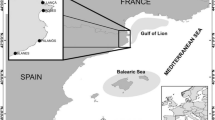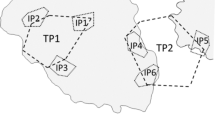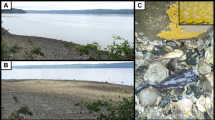Abstract
Underwater observations conducted in Lake Tanganyika showed that males of a maternal mouthbrooding cichlid, Petrochromis fasciolatus, defended a mating territory for at least several months, but left at approximately noon every day. After the experimental removal of males from their territories, new owners occupied the vacated territories within several days. New owners exhibited higher body-condition factors and fat indices than the original owners. These results suggest that the new owners had not previously occupied a territory, considering the physical exhaustion of owners owing to the energy expenditure on territory maintenance and mating behaviors and a limited time for feeding. Original owners had heavier testes than new owners, despite similar body sizes. This disparity in testis weight suggests that energy investment in testes increases following territory acquisition. Among males that newly occupied a territory during the observation period, larger individuals occupied territories sooner, suggesting that large body size facilitates competition for territory. It is concluded that energy investment in testes is delayed for somatic growth until territory acquisition.



Similar content being viewed by others
References
Barlow GW, Rogers W, Fraley N (1986) Do Midas cichlids win through prowess or daring? It depends. Behav Ecol Sociobiol 19:1–8
Borowsky RL (1973) Social control of adult size in males of Xiphophorus variatus. Nature 245:332–335
Borowsky RL (1978) Social inhibition of maturation in natural population of Xiphophorus variatus (Pisces: Poeciliidae). Science 201:933–935
Bye VJ (1984) The role of environmental factors in the timing of reproductive cycles. In: Potts GW, Wootton RJ (eds) Fish reproduction: strategies and tactics. Academic Press, London, pp 187–205
Enquist M, Ljungberg T, Zandor A (1987) Visual assessment of fighting ability in the cichlid fish Nannacara anomala. Anim Behav 35:1262–1263
Fishelson L (1970) Protogynous sex reversal in the fish Anthias squamipinnis (Teleostei, Anthiidae) regulated by the presence or absence of a male fish. Nature 227:90–91
Fricke HW, Fricke S (1977) Monogamy and sex change by aggressive dominance in coral reef fish. Nature 266:830–832
Grant JWA (1997) Territoriality. In: Godin JJ (ed) Behavioural ecology of teleost fishes. Oxford University Press, New York, pp 81–103
Hert E (1990) Factors in habitat partitioning in Pseudotropheus aurora (Pisces: Cichlidae), an introduced species to a species-rich community of Lake Malawi. J Fish Biol 36:853–865
Karino K (1996) Tactic for bower acquisition by male cichlids, Cyathopharynx furcifer, in Lake Tanganyika. Ichthyol Res 43:125–132
Kohda M, Takemon Y (1996) Group foraging by the herbivorous cichlid fish, Petrochromis fasciolatus, in Lake Tanganyika. Ichthyol Res 43:55–63
Kuwamura T (1986) Parental care and mating systems of cichlid fishes in Lake Tanganyika: a preliminary survey. J Ethol 4:129–146
Kuwamura T (1997) The evolution of parental care and mating systems among Tanganyikan cichlids. In: Kawanabe H, Hori M, Nagoshi M (eds) Fish communities in Lake Tanganyika. Kyoto University Press, Kyoto, pp 59–86
Loiselle PV, Barlow GW (1978) Do fishes lek like birds? In: Reese ES, Lighter FJ (eds) Contrasts in behavior: adaptations in the aquatic and terrestrial environments. Wiley-Interscience Publication, New York, pp 31–75
Maan ME, Groothuis TGG, Wittenberg J (2001) Escalated fighting despite predictors of conflict outcome: solving the paradox in a South American cichlid fish. Anim Behav 62:623–634
McKaye KR (1983) Ecology and breeding behavior of a cichlid fish, Cyrtocara eucinostomus, on a large lek in Lake Malawi, Africa. Env Biol Fish 8:81–96
McKaye KR (1984) Behavioural aspects of cichlid reproductive strategies: patterns of territoriality and brood defence in Central American substratum spawners and African mouth brooders. In: Potts GW, Wootton RJ (eds) Fish reproduction: strategies and tactics. Academic Press, London, pp 245–273
Neat FC, Huntingford FA, Beveridge MMC (1998) Fighting and assessment in male cichlid fish: the effects of asymmetries in gonadal state and body size. Anim Behav 55:883–891
Poll M (1986) Classification des Cichlidae du lac Tanganyika: tribus, genres et espèces. Mém Acad r Belg Cl Sci 45:5–163
Rossiter A (1994) Territoriality, mating success, and the individual male in a lekking cichlid fish. In: Jarman PJ, Rossiter A (eds) Animal societies: individuals, interactions and organization. Kyoto University Press, Kyoto, pp 43–55
Snelson FF Jr (1989) Social and environmental control of life history traits in Poeciliid fishes. In: Meffe GK, Snelson FF Jr (eds) Ecology & evolution of livebearing fishes (Poeciliidae). Prentice Hall, New Jersey, pp 149–161
Sohn JJ (1977) Socially induced inhibition of genetically determined maturation in the platyfish, Xiphophorus maculatus. Science 195:199–201
Stearns SC (1992) The evolution of life histories. Oxford University Press, New York
Thresher RE (1984) Reproduction in reef fishes. T. F. H. Publications, Neptune City, New Jersey
Turner G (1994) The fighting tactics of male mouthbrooding cichlids: the effects of size and residency. Anim Behav 47:655–662
Turner G, Huntingford FA (1986) A problem for game theory analysis: assessment and intention in male mouthbrooder contests. Anim Behav 34:961–970
Acknowledgments
The fieldwork was conducted under the research agreement between the Fisheries Department of Zambia and the Japanese research team “MANENO.” We thank the staff of Lake Tanganyika Research Unit of Fisheries Research Institute, Mpulungu, Zambia, for facilities and assistance during the field work. We are also grateful for technical assistance on drawing of the figures from S. Miyagawa, T. Murakami, and K. Saito. Useful comments on the manuscript were provided by two anonymous referees. H. Ochi participated in this work as a guest researcher of the Center for Ecological Research, Kyoto University. This study was financially supported by Overseas Scientific Research (no. 04041078) from the Ministry of Education, Culture, Sports, Science and Technology, Japan.
Author information
Authors and Affiliations
Corresponding author
About this article
Cite this article
Ochi, H., Takeyama, T. & Yanagisawa, Y. Increased energy investment in testes following territory acquisition in a maternal mouthbrooding cichlid. Ichthyol Res 56, 227–231 (2009). https://doi.org/10.1007/s10228-008-0088-4
Received:
Revised:
Accepted:
Published:
Issue Date:
DOI: https://doi.org/10.1007/s10228-008-0088-4




